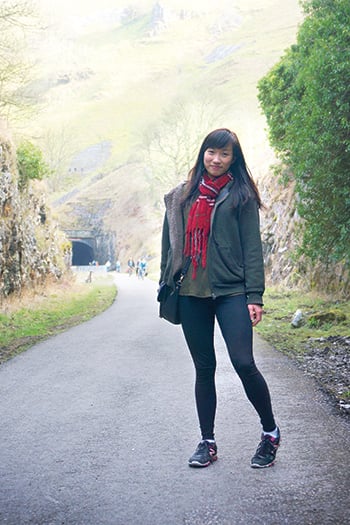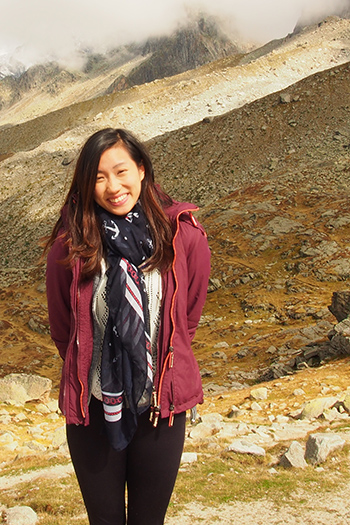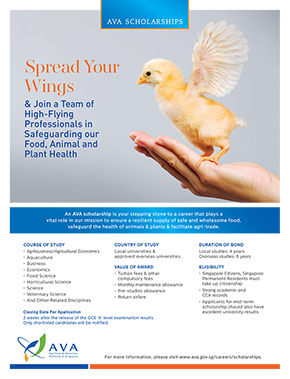As an AVA scholar, Chong Qi Ai aspires to safeguard the health and welfare of animals in Singapore.
T
he Agri-Food & Veterinary Authority of Singapore (AVA) protects the health and safety of our country’s animals and plants. They also ensure that we have a safe and secure food supply. This meaningful mission echoes Chong Qi Ai’s love and respect for animals. The AVA Overseas Undergraduate Scholar, who is currently pursuing a degree in Zoology at UK’s University of Sheffield, tells us more about her fulfilling journey with AVA.
Did you always know that you wanted to work with animals?
Chong Qi Ai: I was always inclined to a career which involves working with animals. Since young, I have always loved animals! My interest in animals grew when I took several courses in animal behaviour during my diploma programme. I was surprised to learn about the extensive application of scientific theory in animal welfare practices. These theories are applied to farm and wild animals in captivity, as well as companion animals. In this, I saw the potential to improve animal welfare practices. This sparked my zeal for learning about ways to apply scientific knowledge to animal welfare practices.

Chong Qi Ai
AVA Overseas Undergraduate Scholar
Bachelor of Biological Sciences (Zoology) student at the University of Sheffield
Why did you choose to pursue Zoology at the University of Sheffield?
Qi Ai: The University of Sheffield has a highly regarded faculty which teaches organismal biology, with a focus on animal behaviour science. The education that I have been receiving from the dedicated lecturers and scientists in the department is top-notch. It creates a student-centred, academically challenging environment where I am pushed to learn, and reach my full potential.
The focus on hands-on learning also ensures that I have the practical skills to complement theoretical knowledge. The University of Sheffield also offers an extensive range of facilities such as controlled environment chambers that are capable of mimicking different climates, and equipment for bio molecular and DNA analysis. Having such facilities on site greatly facilitates learning.
Share with us some memorable episodes you have had in your undergraduate journey.
Qi Ai: During the previous summer break, I was involved in a residential volunteering programme at a wildlife rescue centre in Scotland. I was exposed to a wide variety of wild animals that I would not have been able to encounter in Singapore. The animals ranged from orphaned fox cubs to swans with broken wings, and even an injured seal! The work was physically demanding, requiring us to work 12 hours a day, from 8am to 8pm. It was not always pleasant either, as the work involved plenty of feeding and cleaning of maggot-infested aviaries.
However, it gave me the opportunity to meet and interact with an international community that is committed to the betterment of animal welfare. I enjoyed interacting with the staff and other volunteers from various countries such as France, Italy and Scotland!
“I was exposed to a wide variety of wild animals that I would not have been able to encounter in Singapore. The animals ranged from orphaned fox cubs to swans with broken wings, and even an injured seal!”
What other activities are you involved in?
Qi Ai: Currently, I am a volunteer at the Sheffield cat shelter, and the dog rehabilitation centre in Rotherham. Beyond the fulfilment I get from helping animals, the practical experience in animal handling complements what I learn in classes.
Taking up these extra-curricular activities has better prepared me for the workplace. Through these experiences, I have gained soft skills that I believe are highly important for a career at AVA, where much of the work involves working with people from all walks of life.
Tell us more about your internship experience with AVA.
Qi Ai: I was attached to the Quarantine and Inspection Group (QIG), where I observed the various procedures involved in the inspection of animals and food imported into Singapore. I learnt to appreciate the effort AVA officers put in, to ensure that imported food is fit for consumption, and imported animals are free from diseases. AVA officers have a duty to keep the community safe, and I have learnt that it is important to be thorough in our jobs.
I was also attached to the Animal Management Group (AMG), where I accompanied several officers on their regular duties involving animal control. The most memorable experience was shadowing an AVA officer as he made his rounds addressing the concerns of residents, pertaining to animal disturbances. I realised that the job requires skills in conflict resolution and negotiation. This is a skill which I am trying to develop in university, to prepare for my future career at AVA.
How does AVA support its scholars?
Qi Ai: AVA has a mentor-mentee programme, which connects us to returned scholars who have begun their careers at AVA. The programme matches us up with scholars who have studied a similar discipline or are working in a similar field. These returned scholars act as mentors to new scholars, answering career-related queries.
AVA also has a buddy system, which connects us to fellow studying scholars in the same university or region. Buddies help to ease the transition into university life. This is particularly important for overseas scholars like me, who face a great deal of change as we begin our tertiary education in a foreign environment and culture.
How will you add value to AVA in the near future?
Qi Ai: I hope to contribute to the animal welfare department at AVA by applying the scientific knowledge I have gained from my education at the University of Sheffield. In the UK, laws protecting animal welfare are created based on a large body of credible scientific research.
I wish to contribute to the welfare standards in Singapore by helping AVA maintain scientifically sound, and up-to-date welfare practices for production, wildlife and companion animals. I would also like to come up with innovative methods to educate the public on animal welfare and animal control issues, by emphasising the importance of responsible pet ownership and encouraging adoption. I believe that tackling these two issues will increase the ability of AVA to safeguard the health and welfare of animals in Singapore.
Why would you encourage others to choose an AVA scholarship?
Qi Ai: I would encourage anyone with a passion for animals to undertake the AVA scholarship. A career with AVA will allow you to make a difference in the lives of animals on a larger scale. By taking on supervisory roles and participating in policy formation, work in AVA goes beyond the immediate needs of animals. This ensures that they have a safe living environment, and ensures continued welfare. Furthermore, the AVA scholarship affords you the fantastic opportunity to study overseas. The experience of living independently in a foreign country really opens up your worldview and allows you to see things from different perspectives.



